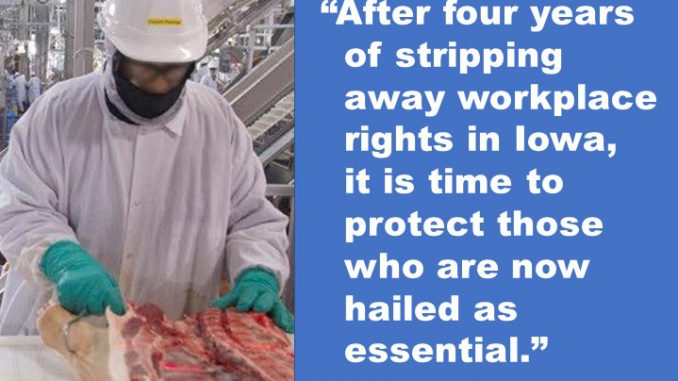
More than 100 years ago, Upton Sinclair chronicled the misery and abuse of American workers in the meatpacking industry.
In The Jungle, he described the packing plants as “centers of contagion, poisoning the lives of all of us.”
Today, we are witnessing a new chapter in the life and deaths of meatpacking workers and other essential workers through the COVID-19 pandemic.
They are called “heroes,” but it’s clear where they rank in this public health crisis. It is painless to say you support them and are proud of those on the front line of public health, the nation’s food supply, or our economy. The hard part: Doing what’s needed when casualties start to mount. And casualties are mounting.
Too many leaders have shown an alarming willingness to abandon front-line workers the moment words aren’t enough. When outbreaks hit meatpacking plants, the inspectors didn’t rush in. There are still no new workplace safety rules or clarifications of workers’ compensation eligibility for infections.
The state took a costly wait-and-see approach. When testing was rolled out, the infection rates were staggering. This week, nearly 60% of the meatpacking workers at one Iowa plant tested positive. That doesn’t include those who couldn’t be tested, meaning more than two-thirds of that workforce is likely infected. Still, the state and federal governments remain on the sidelines when it comes to worker protection, even after the Defense Production Act was used to keep plants open.
After four years of stripping away workplace rights, it is time to protect those who are now hailed as essential. For our workers and our economy, we need a law and rules presuming COVID-19 infections as qualifying for workers’ compensation and providing a minimum of two weeks of benefits to workers with a positive diagnosis. Those carrying the infection must be removed from their workplace and be supported by benefits for necessary time off—for their own safety and that of their coworkers, families, and communities. Unless another source of infection is proven, no worker who remains on the job should have to fend for themselves on medical care or income when the risks they were asked to take become reality. This should be our first bipartisan priority when the legislative session resumes.
The state also must back off the dangerous message that refusing to work is simply a “quit” and recognize, with unemployment rules, quits for good cause when employers fail to take reasonable precautions where increased risks of transmission exist.
Our essential workers are critical to Iowa’s success. By ensuring they are protected and can take time off when infected, we can reduce the spread of disease and get a step ahead on future outbreaks. Then, after addressing these immediate concerns, we can work on positive policies.
A government of the people holds a sacred duty and trust to protect the people it serves. If it undermines the wellbeing of its workforce, it has fundamentally failed its purpose. It’s time to repair Iowa’s broken trust with the workers who will strengthen our state’s future.
